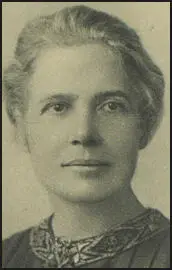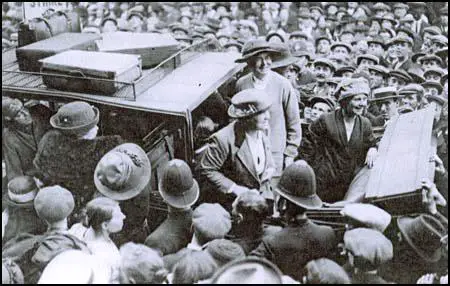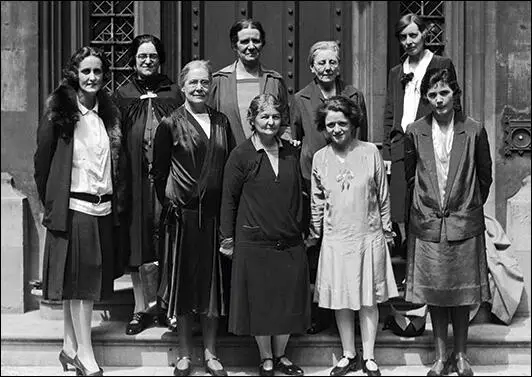Susan Lawrence

Susan Lawrence, the daughter of Nathaniel Lawrence, a wealthy solicitor, and Laura Bacon, was born in London on 12th August 1871. After being educated at University College and Newnham College, she worked as a school manager. In 1900 she was elected to the London School Board and four years later, was co-opted to the education committee of the London County Council.
Lawrence was originally a supporter of the Conservative Party. According to her biographer, David W. Howell: "As an undergraduate Lawrence was a committed Conservative, a supporter of empire and the Church of England. Her concern with education incorporated a strong emphasis on provision for church schools, which was evident in her subsequent activities as a school manager and a member of the London school board. She had a deep commitment to philanthropy and a thorough appreciation of the principles underlying the work of the Charity Organization Society.
In March 1910 she was elected to the London county council (LCC) as a Municipal Reform (Conservative) councillor for affluent West Marylebone." However, under the influence of Beatrice Webb and Sidney Webb, she joined the Fabian Society (1911) and the Labour Party (1912).
After meeting Mary Macarthur, Lawrence joined the Women's Trade Union League and spent the next ten years working for the cause. Despite her monocle and aristocratic manner, Lawrence gradually won over working women in London. As well as helping to organize women workers, Lawrence co-wrote two books on the subject, Women in the Engineering Trades (1917) and Labour Women and International Legislation (1919). During the First World War, Lawrence was a Fabian representative on the War Emergency Workers' National Committee, "a grand coalition of Labour and socialists that avoided divisive debate over the legitimacy of the war and concentrated on practical proposals for working-class amelioration."
In November 1919 Susan Lawrence was elected to Poplar Council. The Labour Party had won 39 of the 42 council seats. In 1921 Poplar had a rateable value of £4m and 86,500 unemployed to support. Whereas other more prosperous councils could call on a rateable value of £15 to support only 4,800 jobless. George Lansbury proposed that the Council stop collecting the rates for outside, cross-London bodies. This was agreed and on 31st March 1921, Poplar Council set a rate of 4s 4d instead of 6s 10d. On 29th the Councillors were summoned to Court. They were told that they had to pay the rates or go to prison. At one meeting Millie Lansbury said: "I wish the Government joy in its efforts to get this money from the people of Poplar. Poplar will pay its share of London's rates when Westminster, Kensington, and the City do the same."
On 28th August over 4,000 people held a demonstration at Tower Hill. The banner at the front of the march declared that "Popular Borough Councillors are still determined to go to prison to secure equalisation of rates for the poor Boroughs." The Councillors were arrested on 1st September. Five women Councillors, including Susan Lawrence, Millie Lansbury and Julia Scurr, were sent to Holloway Prison. Twenty-five men, including George Lansbury and John Scurr, went to Brixton Prison. On 21st September, public pressure led the government to release Nellie Cressall, who was six months pregnant. Julia Scurr reported that the "food was unfit for any human being... fish was given on Friday, they told us, that it was uneatable, in fact, it was in an advanced state of decomposition".

Jeannie MacKay, Susan Lawrence and Nellie Cressall (1921)
Instead of acting as a deterrent to other minded councils, several Metropolitan Borough Councils announced their attention to follow Poplar's example. The government led by Stanley Baldwin and the London County Council was forced to back down and on 12th October, the Councillors were set free. The Councillors issued a statement that said: "We leave prison as free men and women, pledged only to attend a conference with all parties concerned in the dispute with us about rates... We feel our imprisonment has been well worth while, and none of us would have done otherwise than we did. We have forced public attention on the question of London rates, and have materially assisted in forcing the Government to call Parliament to deal with unemployment."
In the 1923 General Election, Lawrence became Labour MP for East Ham North. Two other rate rebels, John Scurr, and George Lansbury were all elected to the House of Commons. The Labour Party won 191 seats. Although the Conservative Party had 258 seats, Herbert Asquith announced that the Liberal Party would not keep the Tories in office. If a Labour Government were ever to be tried in Britain, he declared, "it could hardly be tried under safer conditions".
On 22nd January, 1924 Stanley Baldwin resigned. At midday, Ramsay MacDonald went to Buckingham Palace to be appointed prime minister. MacDonald had not been fully supportive of the Poplar Councillors since he thought that "public doles, Popularism, strikes for increased wages, limitation of output, not only are not Socialism but may mislead the spirit and policy of the Socialist movement." George Lansbury was therefore not offered a post in his Cabinet.
John Wheatley, the new Minister of Health, had been a supporter of the Poplar Councillors. Edgar Lansbury wrote in The New Leader that he was sure that Wheatley would "understand and sympathise with them in this horrible problem of poverty, misery and distress which faces them." Lansbury's assessment was correct and as Janine Booth, the author of Guilty and Proud of It! Poplar's Rebel Councillors and Guardians 1919-25 (2009), has pointed out: "Wheatley agreed to rescind the Poplar order. It was a massive victory for Poplar, whose guardians had lived with the threat of legal action for two years and were finally vindicated."
During the Labour government of 1924 she was parliamentary private secretary to Charles Trevelyan at the Board of Education. Defeated the the 1924 General Election, Lawrence returned to the House of Commons at a by-election in April 1926.

Cynthia Mosley, Marion Phillips, Susan Lawrence, Edith Picton-Turbervill,
Margaret Bondfield, Ethel Bentham, Ellen Wilkinson, Mary Hamilton and Jennie Lee
When Ramsay MacDonald formed a Labour Government after the 1929 General Election, Lawrence became Parliamentary Secretary to the Minister of Health. In this post she helped guide the Widows, Orphans and Old Age Pensions Bill through Parliament. David W. Howell, her biographer, has pointed out: " Like others among her generation of Labour women, such as Ethel Bentham and Margaret Bondfield, and in contrast to Lady Astor and some of the younger Labour women like Jennie Lee and Ellen Wilkinson, Lawrence was completely indifferent to pressure to present a feminine image. It was noted how, as a minister, she took no interest in her choice of clothes, sending round to a department store for half a dozen inexpensive dresses to be sent to her office, and briefly raising her head from her papers to select one by pointing with a pencil."
The election of the Labour Government coincided with an economic depression and Ramsay MacDonald was faced with the problem of growing unemployment. In January 1929, 1,433,000 people were out of work, a year later it reached 1,533,000. By March 1930, the figure was 1,731,000. In June it reached 1,946,000 and by the end of the year it reached a staggering 2,725,000. That month MacDonald invited a group of economists, including John Maynard Keynes, J. A. Hobson, George Douglas Cole and Walter Layton, to discuss this problem. However, he rejected all those ideas that involved an increase in public spending.
In March 1931 Ramsay MacDonald asked Sir George May, to form a committee to look into Britain's economic problems. The committee included two members that had been nominated from the three main political parties. At the same time, John Maynard Keynes, the chairman of the Economic Advisory Council, published his report on the causes and remedies for the depression. This included an increase in public spending and by curtailing British investment overseas.
Philip Snowden rejected these ideas and this was followed by the resignation of Charles Trevelyan, the Minister of Education. "For some time I have realised that I am very much out of sympathy with the general method of Government policy. In the present disastrous condition of trade it seems to me that the crisis requires big Socialist measures. We ought to be demonstrating to the country the alternatives to economy and protection. Our value as a Government today should be to make people realise that Socialism is that alternative."
When the May Committee produced its report in July, 1931, it forecast a huge budget deficit of £120 million and recommended that the government should reduce its expenditure by £97,000,000, including a £67,000,000 cut in unemployment benefits. The two Labour Party nominees on the committee, Arthur Pugh and Charles Latham, refused to endorse the report.
The cabinet decided to form a committee consisting of Ramsay MacDonald, Philip Snowden, Arthur Henderson, Jimmy Thomas and William Graham to consider the report. On 5th August, John Maynard Keynes wrote to MacDonald, describing the May Report as "the most foolish document I ever had the misfortune to read." He argued that the committee's recommendations clearly represented "an effort to make the existing deflation effective by bringing incomes down to the level of prices" and if adopted in isolation, they would result in "a most gross perversion of social justice". Keynes suggested that the best way to deal with the crisis was to leave the Gold Standard and devalue sterling. Two days later, Sir Ernest Harvey, the deputy governor of the Bank of England, wrote to Snowden to say that in the last four weeks the Bank had lost more than £60 million in gold and foreign exchange, in defending sterling. He added that there was almost no foreign exchange left.
Philip Snowden presented his recommendations to the MacDonald Committee that included the plan to raise approximately £90 million from increased taxation and to cut expenditure by £99 million. £67 million was to come from unemployment insurance, £12 million from education and the rest from the armed services, roads and a variety of smaller programmes. Arthur Henderson and William Graham rejected the idea of the proposed cut in unemployment benefit and the meeting ended without any decisions being made.
Susan Lawrence and Frederick Pethick-Lawrence both decided to resign from the government if the cuts to the unemployment benefit went ahead: Pethick-Lawrence wrote: "Susan Lawrence came to see me. As Parliamentary Secretary to the Ministry of Health, she was concerned with the proposed cuts in unemployment relief, which she regarded as dreadful. We discussed the whole situation and agreed that, if the Cabinet decided to accept the cuts in their entirety, we would both resign from the Government."
Ramsay MacDonald went to see George V about the economic crisis on 23rd August. He warned the King that several Cabinet ministers were likely to resign if he tried to cut unemployment benefit. MacDonald wrote in his diary: "King most friendly and expressed thanks and confidence. I then reported situation and at end I told him that after tonight I might be of no further use, and should resign with the whole Cabinet.... He said that he believed I was the only person who could carry the country through."
According to Harold Nicolson, the King decided to consult the leaders of the Conservative and Liberal Parties. Herbert Samuel told the King that he should try and persuade MacDonald to make the necessary economies. Stanley Baldwin agreed and said he was willing to serve under MacDonald in a National Government.
After another Cabinet meeting where no agreement about how to deal with the economic crisis could be achieved, Ramsay MacDonald went to Buckingham Palace to resign. Sir Clive Wigram, the King's private secretary, later recalled that George V "impressed upon the Prime Minister that he was the only man to lead the country through the crisis and hoped that he would reconsider the situation." At a meeting with Stanley Baldwin, Neville Chamberlain and Herbert Samuel MacDonald told them that if he joined a National Government it "meant his death warrant". According to Chamberlain he said "he would be a ridiculous figure unable to command support and would bring odium on us as well as himself."
On 24th August 1931 Ramsay MacDonald returned to the palace and told the King that he had the Cabinet's resignation in his pocket. The King replied that he hoped that MacDonald "would help in the formation of a National Government." He added that by "remaining at his post, his position and reputation would be much more enhanced than if he surrendered the Government of the country at such a crisis." Eventually, he agreed to form a National Government.
The Labour Party was appalled by what they considered to be MacDonald's act of treachery. Arthur Henderson commented that MacDonald had never looked into the faces of those who had made it possible for him to be Prime Minister.
On 8th September 1931, the National Government's programme of £70 million economy programme was debated in the House of Commons. This included a £13 million cut in unemployment benefit. Tom Johnson, who wound up the debate for the Labour Party, declared that these policies were "not of a National Government but of a Wall Street Government". In the end the Government won by 309 votes to 249, but only 12 Labour M.P.s voted for the measures.
On 26th September, the Labour Party National Executive decided to expel all members of the National Government including Ramsay MacDonald, Philip Snowden, Jimmy Thomas and John Sankey. As David Marquand has pointed out: "In the circumstances, its decision was understandable, perhaps inevitable. The Labour movement had been built on the trade-union ethic of loyalty to majority decisions. MacDonald had defied that ethic; to many Labour activists, he was now a kind of political blackleg, who deserved to be treated accordingly."
The 1931 General Election was held on 27th October, 1931. MacDonald led an anti-Labour alliance made up of Conservatives and National Liberals. It was a disaster for the Labour Party with only 46 members winning their seats. Lawrence lost her seat for East Ham North.
Although she failed to become MP again, she continued to be a member of the national executive for the Labour Party. Lawrence was a strong critic of the Soviet Union, yet her last significant intervention within the party's national executive in March 1940 was to oppose the expulsion from the party of the pro-Soviet lawyer D. N. Pritt for his position on the Russo-Finnish War. Lawrence lost her seat on the executive in 1941, and afterwards concentrated on transcribing books into Braille.
Susan Lawrence, who never married, died at her home, 28 Bramham Gardens, South Kensington, on 24th October 1947 and was cremated at Golders Green. On her death the Times obituarist wrote: "Tall and gaunt of figure in her later years, with rather close-cropped grey hair, piercing eyes, and an engaging habit of darting a finger at one in conversation, speaking in a rather sibilant, husky voice, she was the most transparently honest and unegotistical of politically minded women."

